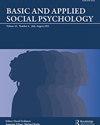接受批评是公众人物有效的印象管理策略吗?否认与反击的比较
IF 1.8
3区 心理学
Q2 PSYCHOLOGY, SOCIAL
引用次数: 2
摘要
摘要公众人物对批评的反应方式会影响对他们的看法和信任。我们测试了公开接受批评的政客是否比拒绝批评的政客更道德、更热情(即更具社区性),更受信任。实验1-3使用虚构的政治家,显示了接受批评对交流和信任的预期积极影响,既不受政治家的党派关系(实验2)的调节,也不受攻击维度(能力或道德;实验3,预先注册)的调节。实验4以即将到来的选举中的领先者为目标,复制了积极的效果,但仅适用于政治取向与政治家所属党派相匹配的参与者。总之,承认错误可以成为公众人物有效的印象管理策略。本文章由计算机程序翻译,如有差异,请以英文原文为准。
Can Accepting Criticism Be an Effective Impression Management Strategy for Public Figures? A Comparison with Denials and a Counterattack
Abstract The way public figures react to criticism can influence perceptions of and trust in them. We tested whether politicians who openly accepted criticism were perceived as more moral and warmer (i.e., more communal) and were trusted more than politicians who rejected criticism. Using fictitious politicians, Experiments 1–3 showed the expected positive effect of accepting criticism on communion and trust, moderated neither by the politician’s party affiliation (Experiment 2) nor by attacked dimension (competence or morality; Experiment 3, preregistered). With a front-runner in an upcoming election as target, Experiment 4 replicated the positive effect, but only for participants with a political orientation matching the politician’s affiliation. Taken together, acknowledging mistakes can be an effective impression management strategy for public figures.
求助全文
通过发布文献求助,成功后即可免费获取论文全文。
去求助
来源期刊

Basic and Applied Social Psychology
PSYCHOLOGY, SOCIAL-
CiteScore
4.50
自引率
12.50%
发文量
7
期刊介绍:
Basic and Applied Social Psychology (BASP) emphasizes the publication of outstanding research articles, but also considers literature reviews, criticism, and methodological or theoretical statements spanning the entire range of social psychological issues. The journal will publish basic work in areas of social psychology that can be applied to societal problems, as well as direct application of social psychology to such problems. The journal provides a venue for a broad range of specialty areas, including research on legal and political issues, environmental influences on behavior, organizations, aging, medical and health-related outcomes, sexuality, education and learning, the effects of mass media, gender issues, and population problems.
 求助内容:
求助内容: 应助结果提醒方式:
应助结果提醒方式:


